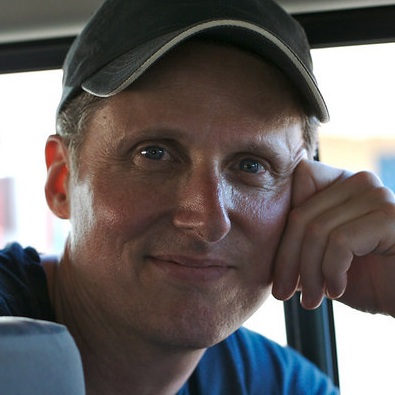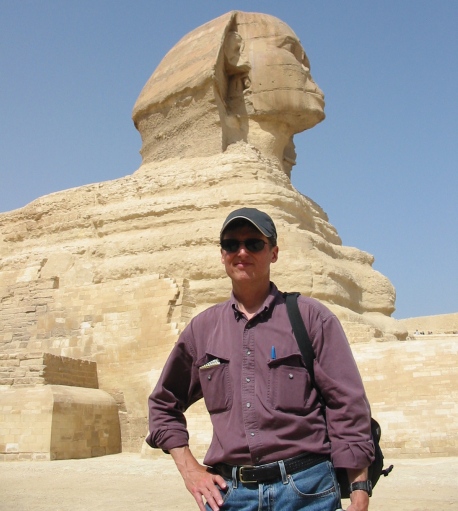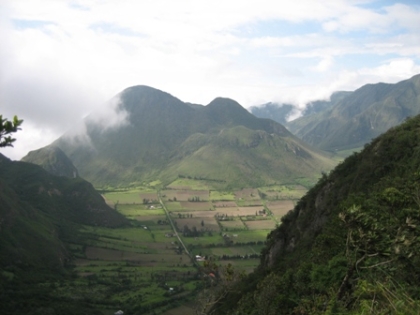Ed Note: “I Do This Because …” is a series of guest essays on this site by adventurers, entrepreneurs, and brave explorers of experience, uncharted territory, and life. As the title indicates, the essays offer the authors’ reflections on why they chose the path they did, and why they continue on that path, despite all the challenges, costs, and discouraging moments that come with any uncharted adventure.
For more information on the origins of the “I Do This Because” essays, see my own entry. And, as always, if you know of anyone you think would make a good guest essayist, or have your own answer to why you’re pursuing the particular, challenging path you’re pursuing, please share it!

About the Author
Brian V. Hunt is a writer and entrepreneur with a lifelong passion for Egypt. He has visited Egypt ten times and remained breathlessly glued to al Jazeera night and day during the 2011 Egyptian Revolution. Friends and family thought him mad for wishing he were with the people he knew who were Tweeting from Tahrir Square in Cairo, but this is the nature of passion and the revolution was one of the most thrilling things he’s ever witnessed, even from afar.
I do this because … I have to
When it comes to passion, there is no other honest ending to the sentence fragment, “I do this because…” except “I have to.” In the darkest moments of our pursuit of passion, we feel a bit unbalanced, maybe even crazy for the intensity of our dedication. We turn the statement into a question: “Why the hell am I doing this?”
Whether that question arises out of physical fear, frustration at the perceived distance of a goal, or distrust of the value of the pursuit, we ask the question to attempt some justification. The end is uncertain and we question our motives, our judgments, and our fortitude to continue. We think the answer to the question above will quell with logic the mounting discomfort we feel.
But it can’t. The nature of passionate pursuit defies logic. I have no explanation for my endless fascination with all things Egyptian and its outsized place in my life, the feelings that Egyptian art and architecture arouse in me, nor for the particular love and kinship I feel for the modern Egyptians. I can only speculate and employ dime store psychology to explain it.
Mystery and treasure
It began in childhood and now rolls into a fifth decade. I remember lying on the dining room floor reading Howard Carter’s The Tomb of Tutankhamun. Carter’s description of finding and opening the tomb, his sense of wonder, and the dissolution of time he felt as he gazed at a small 3,200 year old wreath of dry flowers placed on the boy-king’s coffin the day of his burial brought the events to life for me. A child’s mind is little more susceptible to the allure of mystery and lost treasure than an adult. I was hooked.
It’s interesting that this passion survived a lot of aimless, youthful dissipation during which I didn’t even consider an academic pursuit of Egyptology or archaeology. And there was little to keep the spark alive. Before the Internet, I knew not one other individual with an interest in Egypt. There was no cable TV with endless programs featuring Zahi Hawass (as larger-than-life in person as on TV). There was no Barnes & Noble with dozens of popular books on Egypt. Although interest in Egypt is widespread globally, most people don’t make it central to their daily activity. Persistence of passion is really mystifying.
Fanning the flame
Then, some eleven years after reading Carter’s book, Tut came to Seattle. My somewhat dormant love of Egypt came roaring to life when the Seattle Art Museum sponsored an exhibition of artifacts from Tut’s tomb. Twice I stood in hours-long queues to see glorious objects that I’d to date seen only in black and white photos. I bought a poster of the 1978 exhibition and carried it, rolled up, from place to place for two decades before finally framing and hanging it when I bought a home. It hangs there today.
The cure makes the sickness
Public fascination with Egypt has waxed and waned many times since the Western rediscovery of Egyptian history at the end of the 18th century. It has happened again in recent years. With the advent of cable and the Internet in the 90s, you would have thought I’d become sated with the topic. But instead, I found myself watching and reading everything I could, collecting book after book until my private library of Egyptology numbers nearly 200 volumes.
I thought I might cure this sickness if I were to make a once-in-a-lifetime trip to Egypt. Though I had never been abroad, spoke no Arabic, had all of the Westerner biases about Arabs, and knew nothing about traveling in the Third World, I went to Egypt alone.

The experience transformed my life in ways too numerous to detail in this short essay. I was exposed to a warm, generous, and hospitable culture that I didn’t know still existed anywhere. I was more in awe of the audacious scale and ruined majesty of Egyptian antiquities than I had been in reading about them. I saw real poverty for the first time and made friends in whose homes I’ve stayed on subsequent trips to Egypt. I came home sicker than ever, sometimes feeling like I was enslaved to this passion.
I began attending conferences of the American Research Center in Egypt and listening, enraptured, to lectures by leading Egyptologists on topics like Second Dynasty Economics in the Eastern Delta, Hathor’s Festival of Drunkeness: Evidence from the New Kingdom, and Nile Inundation Theology in the Roman World (all titles from the 2011 conference).
I became consumed by a burning desire to do archaeological field work, to the point of wondering if I should quit my job and go to graduate school (I didn’t). I asked archaeologists about volunteering on a dig, only to be told that due to Egyptian regulations, this was very difficult.
All the while, the question kept arising, “Why the hell am I doing this? To what end am I expending all of this time, energy, and money?” No answer was forthcoming.
Then, in late 2003, through a serendipitous chain of events, I met Dr. Mark Lehner, one of the best known archaeologists and Egyptologists in the world. I was in a position by then to assist his organization, AERA, with a number of jobs that fit my skills as a writer and project manager. Over dinner one evening, to my complete astonishment, Dr. Lehner invited me to Egypt to dig.
The month I spent digging with the AERA team (considered one of the best archaeological teams in the world) in 2004 was one of the happiest of my life. I fulfilled a childhood dream of digging in Egypt. I spent every day in the shadow of the gigantic Giza Pyramids, quite unable to believe my good fortune. I got to see how exhausting and unglamorous real archaeology is, spending cold, February mornings on my aging knees and hot, dusty Giza afternoons packing heavy bags of pottery shards to storage. I loved it.
I spent the next five years intensely involved in AERA and I’m still attached to the organization. In 2009 I spent five weeks in Egypt blogging for the team. I avidly read the field reports during the dig season.
So where is my passion for Egypt today? Not quite as ardent as it once was, or at least not in the same way. Having lived with it for decades, having wonderful experiences that extinguished some of the longing of unfulfilled passion, it’s more like a lover I live with comfortably but occasionally get hot about. I think I could more easily stop calling myself a writer than I could extricate Egypt from my sense of self.
Unintended consequences
The point being that, despite every fabric of your being demanding certain justification, you cannot turn away from passion just because it has no explanation. There may be something in it of value, perhaps even for its own sake. That value is quite often very hard to see, but it’s there. You may not ever define it in concrete terms. I certainly haven’t.
We often think of “unintended consequences” as having a negative connotation. There are unintended consequences in every human act and some of them can be positive. Another reason to pursue passion for its own sake is the risk that much good can come out of it that you didn’t intend. In my pursuit of Egyptology, there were many positive unintended consequences.
Whence again to Egypt?
The other night I saw an old friend from Egypt who happened to be in town. I’ve spent many a day in Egypt with this very funny man who happens to occupy an important position in Egypt’s Supreme Council of Antiquities. I reminded him that when I last saw him in Egypt in 2009, he promised a trip to the White Desert together. He insisted I come to Egypt this year. I can feel that old familiar pull. I’m very tempted.






Hi, I am a student at Eastern Oregon University. I am 61 years young and feel this will help with my degree in Art Therapy.I am writing my capstone on the Burial ceramic pottery ,rituals practices of the Neolithic era in Egypt,China, India and the surrounding areas. I have already done my research but I find myself looking for more to add since I began my research. It is most interesting to me and I can see why you and others are so engrossed with it. To touch and see the past and wonder how people lived and survived is an incredible journey through the past for me. My professor Dr. Linda Jerofke is a wealth of information and enthusiasm in her classes. I enjoy her lectures and the field trips that she offers. Any help you may have that you could pass on to me would be appreciated as I have a few more pages of a 30 page paper I am working on.
Thank You for your time and the information you have give to the world.
Pat Murphy-Rogers
Pat,
Your work sounds very interesting. I’m afraid I’m not of any help, as I’m not a ceramicist and the work I’ve been involved in at Giza deals with 4th Dynasty Egypt and not the Neolithic. My work at Giza has been entirely as an amateur and writer. You might look through our website at http://www.aeraweb.org for information on the work of Dr. Ania Wodzinska.
Regards,
Brian